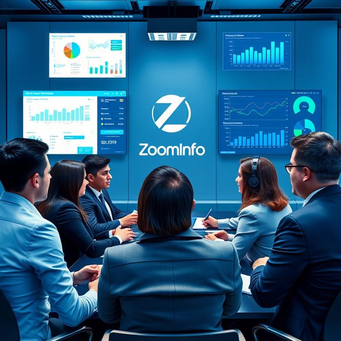
AI is revolutionizing compliance work by automating tasks and improving efficiency. However, executives remain cautious about fully trusting AI due to concerns over errors and accountability. Rob Priore from ZoomInfo discusses how AI is reshaping compliance, balancing automation with human oversight.
How AI is Transforming Compliance Work
Compliance work, often regarded as tedious, repetitive, and detail-oriented, is essential for ensuring that businesses adhere to various legal and regulatory requirements. As regulations become increasingly complex and organizations face growing pressures to maintain compliance, the burden on compliance teams has never been greater. However, with the rise of artificial intelligence (AI), there is a glimmer of hope that these tasks can be streamlined, automated, and made more efficient. AI promises to take the “slog” out of compliance work by handling routine tasks such as data processing, auditing, and regulatory monitoring. Yet, despite the promise of AI’s capabilities, executives remain wary about fully trusting these technologies in the compliance space.
In a recent interview with The Wall Street Journal, Rob Priore, Senior Manager for Compliance Technology at ZoomInfo Technologies, shared his thoughts on AI’s growing role in compliance. Priore emphasized how AI-driven solutions can significantly enhance compliance workflows, but he also highlighted the cautious approach many organizations, including ZoomInfo, take toward integrating AI into their operations. His insights reflect the larger trends in the industry, where the benefits of AI are acknowledged, but trust and the need for human oversight remain significant barriers to full adoption.
This article will delve into the potential of AI in compliance, the challenges companies face in adopting these technologies, and the cautious optimism with which industry leaders like Rob Priore view AI’s future role in the compliance landscape.

The Promise of AI in Compliance Work
AI has the potential to revolutionize compliance work by automating many of the repetitive, time-consuming tasks that typically occupy compliance teams. One of the core advantages of AI is its ability to process vast amounts of data quickly and accurately. This is particularly important in compliance, where businesses must monitor and analyze large volumes of data to stay in line with regulatory requirements. Whether it’s tracking regulatory changes, identifying compliance risks, or auditing financial transactions, AI can significantly reduce the time spent on these tasks, allowing compliance professionals to focus on more strategic aspects of their roles.
Rob Priore explained in his interview that AI is already helping ZoomInfo automate many compliance tasks. “By leveraging AI, we are able to quickly process and analyze regulatory data across multiple jurisdictions to ensure compliance with varying laws like GDPR and CPRA,” he noted. For example, AI can assist in monitoring how ZoomInfo handles customer data, flagging any potential violations in real time and ensuring that necessary steps are taken to rectify the issue. This level of automation is invaluable in the fast-paced world of compliance, where the failure to meet regulatory requirements can lead to hefty fines and reputational damage.
Moreover, AI’s ability to analyze patterns in data allows it to identify compliance risks that may otherwise go unnoticed. Through machine learning algorithms, AI can detect anomalies in transaction data, flagging potential fraudulent activities or non-compliant behavior. This proactive risk management approach can significantly reduce the likelihood of costly compliance breaches and the associated penalties. According to Priore, this predictive capability of AI is one of the most exciting aspects of its integration into compliance functions.
However, while AI offers impressive capabilities, Priore acknowledged that it is not without its challenges. While AI can assist with data processing and risk management, it cannot replace the nuanced judgment and deep regulatory knowledge that human compliance professionals bring to the table.
Challenges in Trusting AI for Compliance
Despite AI’s clear potential, executives and industry leaders remain cautious about fully trusting these technologies in compliance work. One of the primary reasons for this hesitation is the risk of errors. AI systems rely on algorithms to analyze data, but those algorithms can only be as good as the data they are trained on. If the training data is flawed or incomplete, AI systems can make incorrect decisions, leading to non-compliance issues or misinterpretation of regulatory requirements.
Priore emphasized that this is one of the reasons ZoomInfo takes a measured approach to AI adoption in its compliance efforts. “We want to ensure that our AI systems are properly calibrated and that human oversight is always involved,” he explained. While AI can certainly enhance efficiency and accuracy in compliance tasks, it still requires human validation, especially when dealing with complex or ambiguous regulations.
Additionally, AI-driven systems in compliance require constant updates and monitoring to ensure that they remain aligned with evolving regulations. Priore pointed out that regulations can change frequently, and AI systems need to be trained and retrained regularly to stay current. This is a significant challenge for organizations looking to implement AI in compliance, as keeping these systems up to date can be resource-intensive and time-consuming.
Another challenge is the issue of accountability. In the event of a compliance failure, it can be difficult to determine who is responsible when AI systems are involved. “AI decisions can be opaque,” Priore said, referring to the so-called “black box” nature of many AI models. Because AI systems often operate based on complex algorithms that are not always easy to interpret, it can be challenging for companies to explain how a particular decision was made, particularly in highly regulated environments.
Finally, there are concerns regarding security and privacy when using AI in compliance, especially with sensitive customer data. While AI can help improve data security by detecting potential vulnerabilities, there is always a risk of data breaches if the systems are not properly protected. Priore stressed the importance of ensuring that AI-driven compliance tools adhere to stringent data security standards and that customer privacy is never compromised.
ZoomInfo’s Cautious Approach to AI Adoption
At ZoomInfo, Rob Priore and his team have adopted a cautious approach when integrating AI into their compliance operations. Rather than rushing to fully automate compliance processes, the company focuses on using AI to augment the work of human professionals. Priore emphasized that AI is not a replacement for human judgment but rather a tool to assist compliance officers in making more informed decisions.
For example, AI tools can help ZoomInfo’s compliance team automate routine tasks like monitoring regulatory updates, analyzing data privacy compliance, and flagging potential risks. However, when it comes to making final decisions about compliance or interpreting ambiguous regulatory language, human expertise is still necessary. Priore stated, “While AI can handle many tasks, compliance still requires a human touch, especially when dealing with complex issues or ethical considerations.”
ZoomInfo is also working closely with AI startups and external experts to ensure that the company is using cutting-edge technologies that meet the highest standards of security and compliance. Priore mentioned that ZoomInfo actively evaluates new AI-driven compliance solutions, working with vendors to test their systems and ensure they align with the company’s goals.
Moreover, Priore emphasized that the company is committed to maintaining transparency when it comes to the AI tools they use. “We want to make sure that our clients and customers understand how our AI systems work and how we use them to protect their data,” he said. This transparency is critical for building trust with clients, especially in the compliance space, where trust is paramount.
Priore’s cautious approach is reflective of a broader trend in the industry, where many companies are experimenting with AI but remain cautious about relying on it entirely for compliance. The focus is on finding the right balance between human expertise and AI’s capabilities.
The Broader Industry Perspective on AI in Compliance
Rob Priore’s cautious optimism about AI in compliance reflects a broader trend within the industry. While AI is seen as a valuable tool for enhancing efficiency and improving compliance processes, many companies are still hesitant to fully embrace it. According to a 2023 survey by Deloitte, 58% of executives in the financial services sector reported that they had not yet fully integrated AI into their compliance functions, citing concerns about trust and regulatory uncertainty.
However, the same survey revealed that 72% of executives believe AI will become a critical component of their compliance programs within the next five years. This suggests that while there is wariness around AI adoption, there is also significant recognition of its potential to drive innovation in compliance processes.
One of the primary benefits of AI in compliance, as highlighted by Priore, is its ability to streamline the process of monitoring regulatory changes. Regulations are constantly evolving, and keeping track of updates across different regions can be overwhelming for compliance teams. AI-powered tools can automate this process by scanning thousands of sources for changes in regulations, allowing compliance officers to stay up to date without having to manually review each update.
In addition to regulatory monitoring, AI is being used to enhance compliance reporting. For example, AI can automatically generate reports based on data analysis, ensuring that companies can quickly and accurately report their compliance status to regulators. This automation reduces the risk of human error and improves the accuracy of compliance reports, which is essential for meeting regulatory deadlines.
Another area where AI is gaining traction is in the realm of risk management. Machine learning algorithms can analyze historical data and identify patterns that may indicate potential compliance risks. This allows companies to proactively address issues before they become larger problems. As Priore noted, “AI can help us detect issues early on, giving us the opportunity to address them before they escalate.”
Despite these benefits, the trust barrier remains. While AI can automate many aspects of compliance, it is still reliant on human oversight to ensure its decisions are accurate and aligned with regulatory requirements.
Ethical Considerations in AI Adoption
As with any technology, AI adoption in compliance raises important ethical considerations. Rob Priore emphasized that AI should be developed and implemented in a way that promotes fairness, transparency, and accountability. This is particularly critical when AI systems are used to process sensitive customer data.
One of the ethical concerns surrounding AI in compliance is the risk of bias. AI algorithms are only as unbiased as the data they are trained on, and if the training data contains biases, the AI system can perpetuate these biases in its decision-making processes. Priore highlighted the importance of using diverse and representative datasets to train AI systems to minimize the risk of biased outcomes.
Another ethical consideration is the potential for AI to invade privacy. Compliance tools often deal with sensitive customer information, and it is crucial to ensure that AI systems respect privacy and adhere to stringent data protection standards. Priore pointed out that any AI-driven compliance tool used at ZoomInfo must meet rigorous security and privacy standards to protect customer data and maintain trust.
As AI becomes more integrated into compliance functions, the ethical considerations around its use will continue to evolve. Companies like ZoomInfo must remain vigilant in ensuring that their AI tools are used responsibly and ethically, and that customers’ rights are always protected.
Looking to the Future: AI’s Evolving Role in Compliance
The future of AI in compliance looks promising, with many experts predicting that AI will continue to play an increasingly important role in the industry. Priore is optimistic about the potential for AI to evolve and become more sophisticated in its ability to analyze regulatory data and assess compliance risks. He also envisions a future where AI is used not just for compliance monitoring but also for predicting potential issues before they arise.
“AI’s role in compliance is going to move from reactive to proactive,” Priore said. “The goal is to anticipate potential problems before they occur, giving us the ability to act quickly and avoid compliance issues.” This predictive capability could revolutionize how companies approach compliance, allowing them to be more proactive in managing risks and preventing violations.
However, Priore reiterated that human oversight will remain essential. While AI can automate many tasks, it still requires human judgment to ensure that decisions are made in line with regulatory standards and ethical considerations.
The future of AI in compliance will also see greater collaboration between AI systems and human professionals. Rather than replacing compliance officers, AI will empower them to focus on higher-level strategic tasks while AI handles the more routine aspects of the work.
Navigating the AI-Driven Future of Compliance
AI is poised to revolutionize compliance work, offering significant benefits in terms of efficiency, accuracy, and risk management. Rob Priore’s insights into ZoomInfo’s cautious approach to AI adoption highlight the challenges that executives face in trusting these technologies fully. While AI can handle many aspects of compliance, human oversight remains crucial to ensure that regulatory requirements are met and ethical standards are upheld.
As AI continues to evolve, it will become an increasingly valuable tool for compliance professionals. However, achieving a balance between AI’s capabilities and human judgment will be essential to navigating the future of compliance in a way that is both efficient and ethical.
FAQs
- How is AI transforming compliance work? AI automates routine tasks such as regulatory monitoring and data analysis, allowing compliance professionals to focus on more strategic activities.
- What are the main challenges of trusting AI for compliance? The main challenges include concerns about errors, data misinterpretation, lack of transparency, and the need for constant updates.
- What is ZoomInfo’s approach to using AI in compliance? ZoomInfo uses AI to enhance human efforts, automating tasks but still relying on human judgment for final decisions.
- What ethical concerns are associated with AI in compliance? Ethical concerns include the potential for bias in AI algorithms, privacy risks, and ensuring that AI systems are transparent and accountable.
- What does the future hold for AI in compliance? AI is expected to evolve into a more predictive tool for compliance, allowing companies to anticipate and address issues before they arise.
To read more about Rob Priore’s insights on AI and compliance, you can access the full interview on The Wall Street Journal’s website at https://www.wsj.com.
Did you find this helpful? If you did please share and stay tuned to our blog !!


